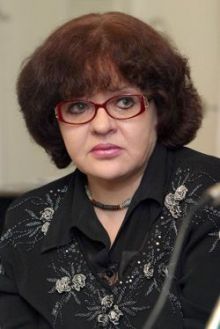Ms. Natalia, James departed this life over five years ago. A lot of events have occurred since then, which he obviously looked forward to and perhaps had a direct or indirect impact on them. The Orange Revolution, the Verkhovna Rada’s recognition of the Holodomor as genocide, Bukovsky’s film…
“Five years without James – a time tragic for me and dramatic for Ukraine… Sometimes, watching certain events, I feel very bitterly how badly we lack Jim. My journalist daughter keeps saying, taken suddenly aback by a piece of news: ‘James would have said so. James would have answered. James would not have allowed this to happen.’ My friends are saying the same. They are so much missing James, his intellect, his ability to see through events, his nerve to go against everybody and do in spite of everything. Let us face it: this sorrowful Passion Week would not have gained this importance had it not been for James, and the candles of our memory and our awakening would not be burning in the windows of our houses. The Institute of National Memory, thousands of monuments all over Ukraine, thousands of studies – all this comprises a fraction of his heart. Students are studying his works and using his priceless library and archive every day. This reflects the worldwide recognition of the Holodomor as an act of anti-Ukrainian genocide. This is the main legacy of James Mace.
“But I would not like somebody to think that opening the pages of Ukrainian history was an end in itself for James. He loved and studied Ukraine, but he cared not so much about its past as about its future. This is why he so often focused in his articles on the problems of the economy, finances, politics, culture, and the making of a civil society. He was cautious of the Ukrainian community’s dangerous propensity to inertness and always warned that old things can only beget old things. He used to say that Ukrainian culture and history conceal the golden grains of a future Ukraine, which one must rediscover and put into practice. James would undoubtedly have been glad to see the works of Raphael Lemkin, founder of the theory of genocide, published in almost thirty languages – the works he propagated so much. His works on the Holodomor as an act of genocide is a serious warning for the present-day world of consumerism. At the same time, James would have been extremely upset over the fact that a study by Hannah Ardent, in which he researches the economics of a totalitarian society, has aroused little interest in the Ukrainian community, although it was published in Ukrainian. Incidentally, this study is a serious warning to the Ukrainian people about the way a nationally-elected government can turn into an anti-people force unless civil-society institutions have been set up.”
Are the people of today aware of the impact that James had on all these processes?
“It is difficult to say what processes James influenced. It is easier to say which ones he did not influence. The pulse of his tense thinking is vibrating in the very core of the Ukrainian intellectual thought. We are in for new discoveries and new surprises because not all of James’s works have reached the reader, and they have a wonderful ability to remain always topical.”







